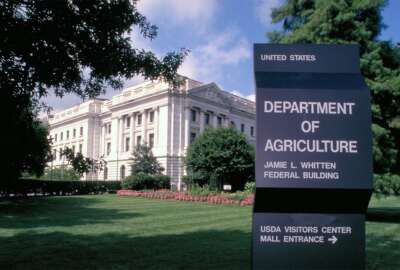Hubbard Radio Washington DC, LLC. All rights reserved. This website is not intended for users located within the European Economic Area.
On Air: Federal News Network
Trending:
More employees returning to USDA facilities this week in DC region
About 700 employees are part of the Agriculture Department's phase two reopening, which began June 22 in the national capital region. USDA Secretary Sonny Perdu...
The Agriculture Department is moving ahead with its reopening plan this week, with approximately 700 employees in the national capital region returning to their offices in the coming days.
Phase two began Monday, the department said Friday evening in an email to USDA employees, which Federal News Network obtained.
Phase one, which began June 1, involved some 400 employees who returned to USDA’s facilities in Washington, D.C., and Beltsville, Maryland, a department spokesperson told Federal News Network.
“Some of these individuals are not coming into the office everyday in person, but are coming in on a rotational basis,” the spokesperson said of USDA’s phase one and two reopening.
USDA Secretary Sonny Perdue welcomed employees back in a video message last week, reassuring them the department had masks, hand sanitizer and social distancing markers throughout the buildings.
“I look forward to seeing all of you,” Perdue said. “While many of you may have different feelings of either excitement or anxiety about coming back to work, we want all of you to feel comfortable there because we are a great team, and we are a great team together when we’re here.”
Perdue thanked employees for their hard work during the first few months of the pandemic, giving special praise to the Farm Production and Conservation component, which stood up the coronavirus food assistance program, and the employees at USDA’s Food Safety and Inspection Service who continued to work.
“We want to welcome those of you who will be coming back into the office,” he said. “But I just want to tell you I’m just blown away by how we’ve continued to fulfill our mission of doing right and feeding everyone during these unprecedented times.”
Friday’s email also describes the department’s cleaning procedures for elevators, restrooms, stairwells, break rooms and other high-traffic areas in USDA facilities in the national capital region.
The department is cleaning those surfaces twice daily, but individual mission areas, agencies and offices are responsible for cleaning and providing hand sanitizer and disinfectant wipes for high-touch areas such as printers, copiers and other office equipment, as well as agency conference rooms and employee offices.
USDA crews will clean those shared spaces every night, but individual mission areas, agencies and offices are responsible for cleaning them after each use.
As described in its reopening plan, the department will provide reusable face coverings to USDA employees throughout all three phases. Employees must ask for one at their facility’s entrance.
USDA’s Office of Safety, Security and Protection plans to interview employees who may test positive for coronavirus to determine who they interacted with and where in the building they traveled. The department will then report positive cases on a SharePoint site for its employees.
“Employees seeking test positive information should visit this site regularly, as USDA will not be doing all employee communications each time a test positive occurs,” David Wu, principal deputy assistant secretary for administration, said in the email to employees. “Based on OSSP’s interview with the COVID‐19 positive employee, supervisors will contact individuals who came in contact with a test positive case. Employees are encouraged to visit the SharePoint site regularly to see the locations of the test positive cases.”
Energy headquarters moving to phase two next week
More employees will return to work at the Energy Department’s headquarters in the national capital region next Monday.
Energy Secretary Dan Brouillette said he made the decision in accordance with state and local governments entering phase two of their own reopening plans on June 22.
“Phase 2 federal employees are now being contacted by their supervisors and provided with opportunities for virtual information sessions regarding how to return to our headquarters facilities in phase 2,” he told employees Friday in an email. “Included will be descriptions of the various precautions such as sanitization, screening criteria, hand sanitizer, signage, and other preparations that have occurred at our HQ buildings.”
Energy employees who are at higher risk for coronavirus or have child care responsibilities can continue to telework throughout most of the department’s reopening.
Brouillette also announced plans to extend the department’s excused absence policy through Sept. 11, 2020 for employees who are teleworking but face childcare challenges during the pandemic.
Energy supervisors can grant up to 20 hours of excused absence per pay period to employees who are dealing with school, daycare and camp closures, as well as those who have other elderly or dependent care responsibilities.
Energy headquarters entered phase one of its reopening plan back on June 8. Just 3.7% of the workforce, about 259 people, planned to return to Energy facilities in Washington and Germantown, Maryland, the department said at the time.
The department declined to provide an estimate for how many employees it anticipated would return to Energy headquarters under phase two of its reopening plan.
The National Treasury Employees Union, which represents some Energy headquarters employees, anticipates at least 45 of its bargaining unit members will return to their offices next week. That number will likely change, because Energy’s phase two plans leaves reentry decisions up to individual department heads, the union said.
“Our local NTEU chapters have been in regular communication with agency management about the reopening and providing them with valuable employee insight into health and safety protocols,” Tony Reardon, NTEU national president, said in a statement to Federal News Network. “For example, employees have said they would prefer masks be mandatory in the workplace, rather than just recommended. It is our understanding that the agency will provide masks at the entrance for employees who do not bring their own, which is a positive step.”
The union is also urging Energy to give more advanced warning to their employees about upcoming return dates. Currently, the department is giving employees about a week’s notice.
In his email to employees, Brouillette said Energy employees hadn’t reported any additional coronavirus cases to the department. Two previous cases have fully recovered.
“With the coronavirus continuing to touch all aspects of our lives, your continued commitment to DoE’s mission and perseverance in delivering critical services to safeguard the nation’s national security are even more commendable.”
Mandatory telework still in place for much of NASA
At NASA, mandatory telework is still in place for most of the agency’s centers. All centers are in stage three or four of NASA’s “return to work on-site” framework,” meaning their facilities are either closed or open to only a select group of employees performing “mission essential work.”
Telework won’t be mandatory under “stage two” of NASA’s reopening framework, but employees who can accomplish work remotely will be encouraged to do so. NASA daycare and fitness centers will open under stage two.
In-person meetings and gatherings will be limited even through stage one, when “full access” is expected at NASA facilities. Employees are expected to be “telework ready” at stage one.
NASA also noted its plans to conduct a “bulk buy” of personal protective equipment for employees at each of its centers. Employees who are doing mission critical work, can’t keep six feet apart from others or are high-risk for the virus will be given PPE, the agency said.
NASA Administrator Jim Bridenstine, who outlined his agency’s reopening plan back in May, said reopening plans ultimately vary depending on each individual center.
“If employees do not feel comfortable returning to or continuing work on-site, they should talk to their supervisor or contract management about options to address their concerns,” he said in a message to employees. “Alternate work arrangements should be made without reservation or reprisal.”
Copyright © 2024 Federal News Network. All rights reserved. This website is not intended for users located within the European Economic Area.
Nicole Ogrysko
Nicole Ogrysko is a reporter for Federal News Network focusing on the federal workforce and federal pay and benefits.
Follow @nogryskoWFED





